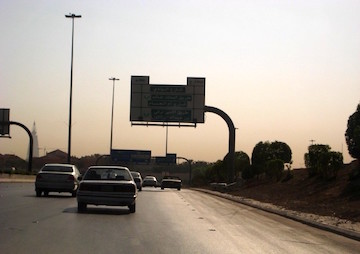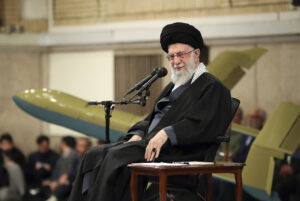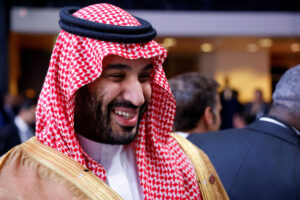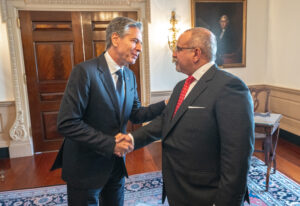Obama Strategist Helps Uber Secure $3.5 Billion From Saudi Arabia
As part of the deal, the managing director of Saudi Arabia's Public Investment Fund will take a seat on the controversial car-hailing company's board. A road in Riyadh, Saudi Arabia. (Andrew A. Shenouda / CC-BY-2.0)
A road in Riyadh, Saudi Arabia. (Andrew A. Shenouda / CC-BY-2.0)
A road in Riyadh, Saudi Arabia. (Andrew A. Shenouda / CC-BY-2.0)
The manager of Barack Obama’s successful 2008 presidential campaign has helped the car service Uber secure a $3.5 billion investment from the kingdom of Saudi Arabia to help expand its controversial operation into the Middle East.
Obama’s strategist, David Plouffe, serves on Uber’s board of advisers. As part of the deal, the managing director of Saudi Arabia’s Public Investment Fund, Yasir Al Rumayyan, will take a seat on Uber’s board, which includes internet news media figure Arianna Huffington.
The New York Times reports:
Uber has been spending not only to expand but also to defend its territory — which covers 460 cities in more than 69 countries — against incumbents in regions like Southeast Asia and Europe. China, in particular, is a difficult battleground, as Uber is spending millions in a subsidy war with Didi Chuxing, the dominant ride-hailing start-up in the country.
The Middle East is among Uber’s increasingly important overseas markets; the company has already said it plans to invest $250 million there. Uber has rolled out its service in 15 cities and nine countries in the region, including Saudi Arabia.
The start-up said that it now has over 395,000 active riders in the Middle East, up fivefold from a year ago, and 19,000 drivers. …
Saudi Arabia has looked for ways to expand its economy beyond oil, with the Public Investment Fund — which is expected to grow to $2 trillion under management after the country’s state-owned oil company goes public — serving as a crucial part of that strategy. The $3.5 billion investment in Uber is out of the Saudi fund’s roughly $750 billion in total United States assets.
Investing in an American company like Uber, however, could run counter to Saudi Arabia’s threat to sell off investments in the United States, issued during discussion about a bill in Congress that would allow the kingdom to be held responsible in American courts for any role in the Sept. 11, 2001, attacks.
Part of Uber’s possible attraction in bringing in a sovereign wealth fund like Saudi Arabia’s is that such investors have far longer investment horizons than venture capitalists, who generally seek to cash out their investments after seven to 10 years.
—Posted by Alexander Reed Kelly.
Your support matters…Independent journalism is under threat and overshadowed by heavily funded mainstream media.
You can help level the playing field. Become a member.
Your tax-deductible contribution keeps us digging beneath the headlines to give you thought-provoking, investigative reporting and analysis that unearths what's really happening- without compromise.
Give today to support our courageous, independent journalists.






You need to be a supporter to comment.
There are currently no responses to this article.
Be the first to respond.